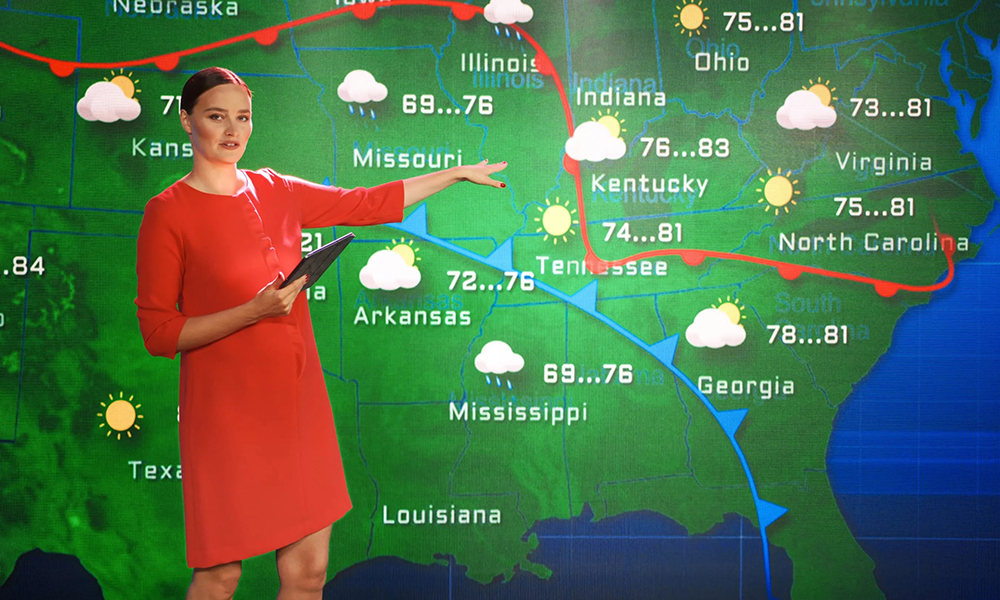
20世纪90年代,在金·本特森从气象学专业毕业时,能选的就业去向只有丹麦国家气象局,金融业根本不在他的考虑范围内。
他在气象局工作了五年,也在两家公司做过销售,后又加入一家能源贸易公司——丹斯克商品公司(Danske Commodities)。作为该公司的首位气象学家,他的老板当时甚至不太清楚如何在交易场中发挥他的才干,所以干脆让他自行决定。
本特森告诉《财富》杂志:“职位介绍里只是说要‘找到你的位置,满足公司需要’。所以具体做些什么工作几乎完全取决于我,我要自己去了解自己在哪里可以发挥作用,或者能为公司提供些价值”。
金融世界一直在不断变化,华尔街交易员的教育背景也会随之改变。上个月,贝莱德(BlackRock)首席运营官对一名《财富》嘉宾说,他们公司在招聘时,特别强调要招聘有文科背景的候选人,而不仅仅是传统的金融和商科毕业生。但随着公司在大宗商品和能源领域采用的交易策略越来越复杂,一门学科却意外受到热捧,那就是气象学。
长期以来,训练有素的气象学家一般都会加入电视台或政府的气象预报机构,从事气象工作,但现在他们却越来越多地开始投身金融领域,并在这里发光发热。由于气候变化使极端天气事件变得越发常见,可再生能源的兴起又催生出了全新的电力市场,准确预报天气的重要性日益凸显。
宾夕法尼亚州立大学气象学与大气科学教授、美国气象学会(American Meteorological Society)前主席詹尼·埃文斯告诉《财富》杂志:“工业界吸收了许多气象学家,行业也越发多样化,比如能源工业、交通运输业等等,不胜枚举”。
事实上,这些气象专家的专业能力或将在未来几个月迎来一场大考。据彭博社(Bloomberg)报道,今年夏天,整个北半球将迎来破纪录热浪,受此影响,包括能源和农作物在内,大宗商品的价格预计将会一飞冲天。
过去几十年,金融领域发生了巨大变化,随之而来的是该行业对气象专业知识的需求明显上升。20世纪90年代初,许多预报员仍需手绘天气图,与后来实现普及的复杂计算机化技术相比,可谓天差地别。
如今,本特森正以气象专家团队成员的身份与丹斯克的交易团队展开合作,就天气趋势将对能源市场产生的影响提供见解。像本特森这样的金融气象学家及其气象团队既关注短期预测,也关注长期预测。例如,他们既要估算当前气象条件对未来几小时或几天内风力涡轮发电机发电量的影响,也要考虑拉尼娜等更大范围现象对作物产量或太阳能输出的影响。新就业场景的出现为刚毕业的学生开辟了一条全新职业道路。
本特森说:“现在,丹麦国家气象研究所员工跳槽的意愿越来越强,而且这种势头有增无减。”
他指出,过去五年,丹麦气象学毕业生在考虑工作去向时的想法已经发生变化,“如果他们想从事金融工作,也不失为一种可行选择”。
在传统雇主(如新闻电视台)采用计算机取代了部分预报人员的工作、对气候科学家的需求出现下降的当下,这对气候科学家来说无疑是个好消息,。
随着巨灾债券市场规模的高速增长,金融部门对天气预报的兴趣也越发高涨。巨灾债券是一种与保险挂钩的小众资产类别,市场规模约1200亿美元,去年,此类债券的回报较普通对冲基金高出35%。同样,天气衍生品(可以在企业遭遇严重风暴或干旱等事件时为其提供保障)的市场规模也达到了250亿美元。在这两个市场,谁能准确预测天气,谁就能掌握终极优势,帮助投资者找到定价不准确的资产。
肯·格里芬旗下市值600亿美元的城堡投资(Citadel)或许比其他任何公司都更善于将预测专长转化为盈利性交易策略。据《金融时报》(Financial Times)报道,在城堡投资从学术界和国家气象预报部门挖来的20人预测团队帮助下,该公司大宗商品部门创造了数十亿美元收入。城堡投资拒绝对此发表评论。
随着天气建模技术的精确度日益提高,相关企业将继续争夺大宗商品和巨灾债券等市场的主导地位,由此可以预见,市场对气象学家专业技能的需求将继续增加。
埃文斯说:“(金融)市场为气象学专业毕业生提供的就业机会在不断增加,不过目前受益的主要是硕士和博士毕业生。为更好地发挥他们的才能,该行业也在不断开拓思路,寻找新的方法。”(财富中文网)
译者:梁宇
审校:夏林
20世纪90年代,在金·本特森从气象学专业毕业时,能选的就业去向只有丹麦国家气象局,金融业根本不在他的考虑范围内。
他在气象局工作了五年,也在两家公司做过销售,后又加入一家能源贸易公司——丹斯克商品公司(Danske Commodities)。作为该公司的首位气象学家,他的老板当时甚至不太清楚如何在交易场中发挥他的才干,所以干脆让他自行决定。
本特森告诉《财富》杂志:“职位介绍里只是说要‘找到你的位置,满足公司需要’。所以具体做些什么工作几乎完全取决于我,我要自己去了解自己在哪里可以发挥作用,或者能为公司提供些价值”。
金融世界一直在不断变化,华尔街交易员的教育背景也会随之改变。上个月,贝莱德(BlackRock)首席运营官对一名《财富》嘉宾说,他们公司在招聘时,特别强调要招聘有文科背景的候选人,而不仅仅是传统的金融和商科毕业生。但随着公司在大宗商品和能源领域采用的交易策略越来越复杂,一门学科却意外受到热捧,那就是气象学。
长期以来,训练有素的气象学家一般都会加入电视台或政府的气象预报机构,从事气象工作,但现在他们却越来越多地开始投身金融领域,并在这里发光发热。由于气候变化使极端天气事件变得越发常见,可再生能源的兴起又催生出了全新的电力市场,准确预报天气的重要性日益凸显。
宾夕法尼亚州立大学气象学与大气科学教授、美国气象学会(American Meteorological Society)前主席詹尼·埃文斯告诉《财富》杂志:“工业界吸收了许多气象学家,行业也越发多样化,比如能源工业、交通运输业等等,不胜枚举”。
事实上,这些气象专家的专业能力或将在未来几个月迎来一场大考。据彭博社(Bloomberg)报道,今年夏天,整个北半球将迎来破纪录热浪,受此影响,包括能源和农作物在内,大宗商品的价格预计将会一飞冲天。
过去几十年,金融领域发生了巨大变化,随之而来的是该行业对气象专业知识的需求明显上升。20世纪90年代初,许多预报员仍需手绘天气图,与后来实现普及的复杂计算机化技术相比,可谓天差地别。
如今,本特森正以气象专家团队成员的身份与丹斯克的交易团队展开合作,就天气趋势将对能源市场产生的影响提供见解。像本特森这样的金融气象学家及其气象团队既关注短期预测,也关注长期预测。例如,他们既要估算当前气象条件对未来几小时或几天内风力涡轮发电机发电量的影响,也要考虑拉尼娜等更大范围现象对作物产量或太阳能输出的影响。新就业场景的出现为刚毕业的学生开辟了一条全新职业道路。
本特森说:“现在,丹麦国家气象研究所员工跳槽的意愿越来越强,而且这种势头有增无减。”
他指出,过去五年,丹麦气象学毕业生在考虑工作去向时的想法已经发生变化,“如果他们想从事金融工作,也不失为一种可行选择”。
在传统雇主(如新闻电视台)采用计算机取代了部分预报人员的工作、对气候科学家的需求出现下降的当下,这对气候科学家来说无疑是个好消息,。
随着巨灾债券市场规模的高速增长,金融部门对天气预报的兴趣也越发高涨。巨灾债券是一种与保险挂钩的小众资产类别,市场规模约1200亿美元,去年,此类债券的回报较普通对冲基金高出35%。同样,天气衍生品(可以在企业遭遇严重风暴或干旱等事件时为其提供保障)的市场规模也达到了250亿美元。在这两个市场,谁能准确预测天气,谁就能掌握终极优势,帮助投资者找到定价不准确的资产。
肯·格里芬旗下市值600亿美元的城堡投资(Citadel)或许比其他任何公司都更善于将预测专长转化为盈利性交易策略。据《金融时报》(Financial Times)报道,在城堡投资从学术界和国家气象预报部门挖来的20人预测团队帮助下,该公司大宗商品部门创造了数十亿美元收入。城堡投资拒绝对此发表评论。
随着天气建模技术的精确度日益提高,相关企业将继续争夺大宗商品和巨灾债券等市场的主导地位,由此可以预见,市场对气象学家专业技能的需求将继续增加。
埃文斯说:“(金融)市场为气象学专业毕业生提供的就业机会在不断增加,不过目前受益的主要是硕士和博士毕业生。为更好地发挥他们的才能,该行业也在不断开拓思路,寻找新的方法。”(财富中文网)
译者:梁宇
审校:夏林
When Kim Bentzen graduated with a meteorology degree in the 1990s, the only career path he saw was Denmark’s national weather service, and going into finance wasn’t on his radar at all.
After five years at the state weather service and two stints working in sales at other companies, he applied for a job at Danske Commodities, an energy trading firm. As the first meteorologist on staff, his bosses were still a little fuzzy on how exactly they would use his skills on the trading floor—they left that part up to him.
“I was there with a job description that just said, find out wherever you fit in to what we need. So it was pretty much up to me—where I could find a niche for myself or where I could find some kind of value I could provide,” Bentzen told Fortune.
The world of finance is always changing, and Wall Street traders’ educational backgrounds are changing with it. Last month, BlackRock’s COO told a Fortune panelist that the firm was emphasizing candidates with backgrounds in the liberal arts in its recruiting, not just traditional finance and business graduates. But one unexpected discipline is in high demand as firms adopt increasingly sophisticated trading strategies in the commodities and energy world: Meteorology.
Long pigeonholed into weather jobs at TV stations or government forecasting agencies, trained meteorologists are increasingly finding opportunities in finance. As climate change makes extreme weather events more common and the rise of renewable energy creates new power markets, accurately forecasting the weather has become a more important edge.
“Industry is absorbing meteorologists for a lot more applications—such as the energy industry, transportation…You can think of many more applications,” Jenni Evans, professor of meteorology and atmospheric science at Penn State and former president of the American Meteorological Society, told Fortune.
In fact, the next few months could put their meteorological skills to the test. Traders are scrambling to brace for a record-breaking heat wave across the Northern Hemisphere this summer, which is expected to send prices for commodities, including energy and crops, flying from historical norms, Bloomberg reported.
An uptick in demand for meteorology expertise in finance has accompanied sea changes across the field more generally over the past few decades. In the early 1990s, many forecasters were still drawing weather maps by hand, a far cry from the sophisticated, computerized techniques that have since become commonplace.
Today, Bentzen is part of a team of meteorology experts that works alongside Danske’s trading floor, providing insight on how weather trends will affect energy markets. Financial meteorologists like Bentzen and his team look at both short-term and long-term forecasts: For example, estimating how weather conditions will affect wind turbines’ generation capacity over the next few hours or days, alongside how larger phenomena like La Niña could impact crop yields or solar output. It’s created a new possible career path for newly minted graduates.
“In Denmark, the people working in the National Weather Institute are more and more open to other places to work. It is something that is growing,” Bentzen said.
He noted that over the past five years, he’s seen a shift in how Danish meteorology grads are thinking about where they want to work, and finance “is a possibility, if they would like to pursue that.”
That’s a welcome development for climate scientists who have been hurt by decreased demand from traditional employers such as news stations, which have slimmed down their forecasting staffs as computers have picked up the slack.
Interest in weather forecasting from the finance sector has swelled alongside huge growth in the market for catastrophe bonds, a niche, insurance-linked $120 billion asset class that outperformed the average hedge fund by by 35% last year. Likewise for weather derivatives, a $25 billion market offering businesses protection from events such as severe storms or droughts. In both of those markets, accurately predicting the weather is the ultimate edge, giving investors the ability to detect inaccurately priced assets.
Perhaps more than any other firm, Ken Griffin’s $60 billion Citadel has leveraged forecasting expertise into a lucrative trading strategy. The Financial Times reported that Citadel’s 20-person-strong forecasting team, hired out of academia and national weather forecasting departments, helped generate multiple billions of dollars’ worth of revenue for the firm’s commodities arm. Citadel declined to comment on this article.
As weather modeling techniques get more accurate and firms continue to compete for alpha in markets like commodities and catastrophe bonds, meteorologists can expect demand for their skills to continue to increase.
“[The financial] market has been expanding as a career possibility, predominantly for master’s and PhD graduates,” Evans said. “That industry has been finding more and more ways to use them.”






